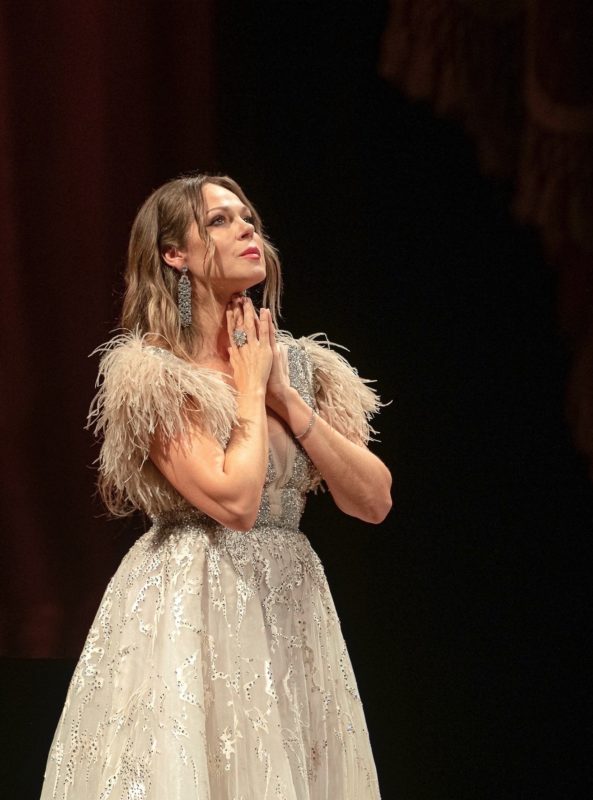Press | November 2, 2021


Press | November 2, 2021

English translations below
“En el marco del ciclo Grandes Intérpretes Internacionales, Kristine Opolais,brindó una función de lujo en el Teatro Colón. La soprano nacida en Letonia en 1979, se presentó por primera vez en nuestra ciudad y es, según reza el programa de mano, una de las “más solicitadas de la escena internacional”. El timbre impresionante de Opolais, su peculiar carisma e impresionante cualidad dramática sustentan semejante enunciado, que mucho dista de ser una exageración o simplemente una frase trillada. El acompañamiento en piano fue realizado por el mendocino Marcelo Ayub, músico y docente de nutrida trayectoria en nuestro país y en el exterior.
La constelación de talentos brilló con un repertorio exquisito dedicado a heroínas operísticas, donde Opolais puso toda su fuerza dramática en el canto y se desplazó por el escenario con toda soltura y gracia. Fácilmente el espectador podría haber pensado que estaba presenciando una versión escénica, con vestuario y todo, y no una versión en concierto.
La primera parte abrió con algunos momentos de Adriana Lecouvreur (Francesco Cilea): el aria Io son l’umile ancella, luego el solo de piano del Interludio del Acto II. Más tarde, el preludio del Acto IV, y una magnífica Poveri fiori. En el medio de esta primera parte, Opolais fue una conmovedora Desdémona en Canzone del Salce… Ave Maria…, aria de la ópera Otello de Giuseppe Verdi. Esta primera parte cerró con Ebben? Ne andró lontana, de La Wally de Alfredo Catalani, conmovedoramente interpretada.
La segunda parte tuvo como primer número el aria de Margherita (L’altra notte in fondo al mare) de Mefistofele (Arrigo Boito, quien fuera el libretista del Otello de Verdi). La destreza vocal y dramática de la soprano fue in crescendo conforme avanzaba la programación. Mientras tanto, Ayub encantó con Isoldens Liebestod de Tristan e Isolda, de Richard Wagner y transcripción de Franz Liszt. Luego, el programa se dedicó enteramente a Giacomo Puccini y tres de sus heroínas más emblemáticas: Tosca (Vissi d’arte), Manon Lescaut (intermezzo para piano solo) -estupendo Marcelo Ayub- y Un bel di vedremo, la muy apreciada aria de Madama Butterfly.
Kristine Opolais, evidentemente, ama y disfruta lo que hace, y sabe compartirlo con quienes, merecidamente, la ovacionan desde las butacas. Quizás por eso sorprendió a todos en el bis, ingresando por el pasillo hacia el escenario e interpretando la Canción a la luna, de Rusalka (Antonin Dvořák) con total encanto. Ya de nuevo sobre el escenario, interpretó O mio babbino caro de Gianni Schicchi de Puccini.
Generosa y simpática, sin aires de diva, cerró espléndidamente la velada con el tercer bis: Sola, perduta, abbandonata, de Manon Lescaut, Luego, sonriente y exultante se abrazó a Ayub y posaron juntos ante las innumerables cámaras de un público feliz.”
“La artista de Latvia lució en efecto emisión franca, buen caudal, ataques netos (`Un bel dì vedremo’), asombrosa facilidad para transportes y modulaciones, y además de ello, a favor de una técnica impecable manejó su voz con absoluto control.
A esto cabe añadir una gestualidad intensamente comunicativa, como si estuviera viviendo cada personaje, y un timbre redondeado, de alma pura y sin fisuras, para plasmar una velada superior”
La Prensa
“Para el primero de los bises, la cantante reservó un nuevo golpe de efecto, al ingresar por el pasillo central de la platea para hechizar completamente con el aria de uno de los roles que la hicieron famosa: la Canción a la luna de Rusalka (Antonín Dvorák).
Después de la ovación de pie para el que probablemente haya sido el momento más memorable de la noche, Opolais recuperó la frescura de su voz con O mio babbino caro (Gianni Schicchi)”
Clarín
English translations
“Within the framework of the series Great International Performers, Kristine Opolais gave a luxury performance at the Teatro Colón. The soprano, born in Latvia in 1979, performed for the first time in our city and is, according to the programme, one of the “most sought-after performers on the international stage”. Opolais’ impressive timbre, her peculiar charisma and impressive dramatic quality underpin such a statement, which is far from being an exaggeration or simply a trite phrase. The piano accompaniment was provided by Marcelo Ayub from Mendoza, a musician and teacher with a long career in our country and abroad.
The constellation of talents shone with an exquisite repertoire dedicated to operatic heroines, where Opolais put all her dramatic strength into her singing and moved around the stage with ease and grace. The audience could easily have thought they were witnessing a stage version, costumes and all, and not a concert version.
The first part opened with a few moments from Adriana Lecouvreur (Francesco Cilea): the aria Io son l’umile ancella, then the piano solo from the Act II Interlude. Later, the prelude to Act IV, and a magnificent Poveri fiori. In the middle of this first part, Opolais was a moving Desdemona in Canzone del Salce… Ave Maria…, an aria from Giuseppe Verdi’s opera Otello. This first part closed with Ebben? Ne andró lontana, from Alfredo Catalani’s La Wally, movingly performed.
The second part had as its first number the aria of Margherita (L’altra notte in fondo al mare) from Mefistofele (Arrigo Boito, who was the librettist of Verdi’s Otello). The soprano’s vocal and dramatic prowess was in crescendo as the programme progressed. Meanwhile, Ayub enchanted with Isoldens Liebestod from Richard Wagner’s Tristan and Isolde, transcribed by Franz Liszt. The programme was then devoted entirely to Giacomo Puccini and three of his most emblematic heroines: Tosca (Vissi d’arte), Manon Lescaut (intermezzo for solo piano) – stupendous Marcelo Ayub – and Un bel di vedremo, the much-loved aria from Madama Butterfly.
Kristine Opolais clearly loves and enjoys what she does, and knows how to share it with those who, deservedly, give her a standing ovation. Perhaps that is why she surprised everyone in the encore, entering the aisle towards the stage and performing Rusalka’s Song to the Moon (Antonin Dvořák) with total charm. Back on stage again, she performed O mio babbino caro from Puccini’s Gianni Schicchi.
Generous and friendly, without any diva airs, she closed the evening splendidly with the third encore: Sola, perduta, abbandonata, from Manon Lescaut. Then, smiling and exultant, she embraced Ayub and they posed together before the countless cameras of a happy audience. “
“The Latvian artist in fact displayed clear tone, good delivery, clear attacks (`Un bel dì vedremo’), an astonishing facility for vocal transports and modulations, and in addition to this, in favour of an impeccable technique, she handled her voice with absolute control.
To this must be added an intensely communicative manner, as if she were inhabiting each character, and a rounded, pure-souled and seamless timbre, to give shape to a superior evening.”
La Prensa
“For the first of the encores, the singer reserved a new surprise, entering through the central aisle of the stalls to completely enchant with the aria from one of the roles that made her famous: the Song to the Moon from Rusalka (Antonín Dvorák).
After the standing ovation for what was probably the most memorable moment of the evening, Opolais regained the freshness of her voice with O mio babbino caro (Gianni Schicchi).”
Clarín
November 5, 2025
Roderick Cox, conductor Kristine Opolais, soprano Mika Kares, bass